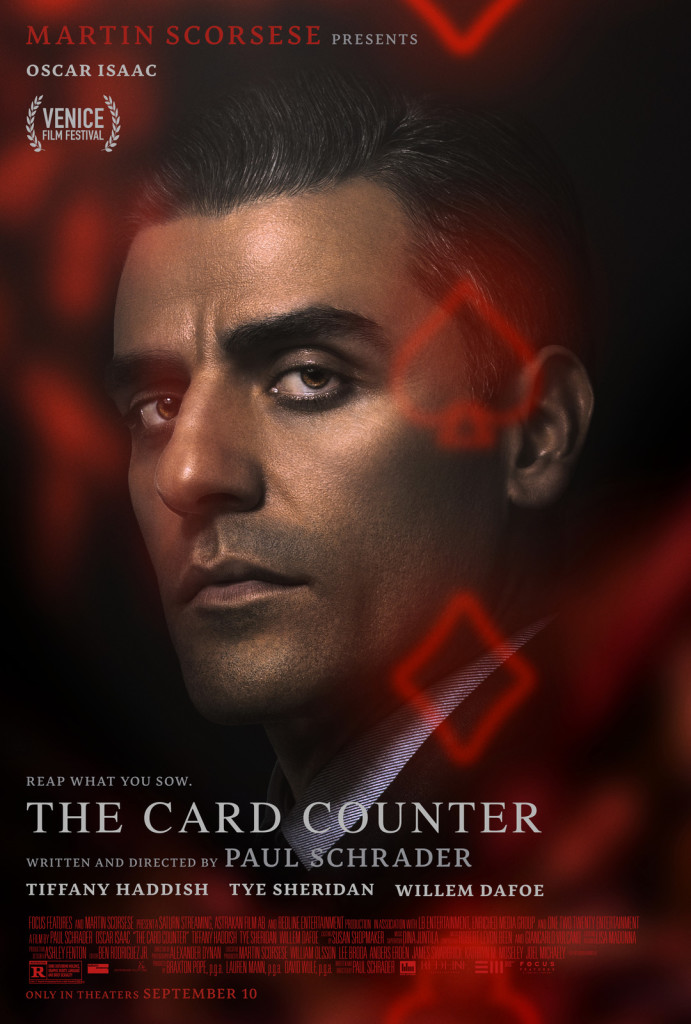Genre: Drama
Premise: A low level blackjack card counter with a dark past makes a risky decision to get staked by a big investor in an attempt to make a lot of money.
About: This is the latest script from Paul Schrader, writer of Taxi Driver. The movie stars Oscar Isaac and has made a lot of fans on the ‘serious critic’ circuit, currently standing at 93% on Rotten Tomatoes.
Writer: Paul Schrader
Details: 94 pages
Readability: Fairly fast (very dialogue driven)
Paul Schrader is a hard writer to figure out. The reason everyone knows his name is because he wrote one of the biggest films of the 70s, Taxi Driver. And, yet, if you asked anyone why they liked the movie, they would inevitably tell you it was because of the directing or the acting. I don’t think a lot of people look at Taxi Driver and think, “Wow, the writing was awesome.”
Contrast that with another famous 70s film, Chinatown, where the writing is very much at the forefront of why people loved it. In these instances where you’re not sure if the writer deserves the recognition that’s given him a career, you look at their body of work. And Paul Schrader’s body of work seems to stir up more questions than answers. He wrote Raging Bull four years later in 1980. But, after that, he has a bunch of movies that fell short of expectation. The Last Temptation of Christ. The Mosquito Coast. Affliction. Even 1999’s Bringing Out the Dead, which got some buzz, ultimately fell short of the mark.
If there’s a lesson to be learned from Schrader’s career, it would be how important a great character is. He found that captivating haunted conflicted man in Travis Bickle and that carried the movie. Cause Taxi Driver is – I hate to say it – not a very well-plotted script. But we don’t care because we’re so interested in the character. And as we learned with White Lotus, a character can become the plot as long as their internal conflict is strong enough that the audience wants to stick around to see if he can resolve it.
While all of you are angrily constructing your “White Lotus isn’t in the same stratosphere as Taxi Driver” comments, I’m going to summarize The Card Counter’s plot. I’ll meet you on the other side…
42 year old William Tell is a card-counter who travels across the country using his special skill of counting blackjack cards to always beat the house. The trick to Tell’s longevity is that he bets small and wins small, trying to keep his winnings under a thousand dollars at every casino. That way, he won’t draw attention to himself.
That changes when a 40 year old woman named La Linda watches him clean up one night and asks him if he wants to be staked by an investor so he can win a lot more money. Tell says no thanks and, a few days later, visits a military-themed exhibition where a speaker recalls his experiences in Iraq.
A 20 year old kid named Cirk pops up and tells Tell he recognizes him. It’s at this point that we learn Tell’s history. He was once an interrogation officer at Abu Ghraib. Tell got screwed because he was caught in several of the infamous pictures that surfaced from the torture camp even though he did not, himself, participate. Cirk tells Tell that he wants to kill the real man responsible for the torture who never had to face any consequences.
The next day, even though Tell has no interest in helping Cirk harm this man, he invites him to come with him to gamble across the country. He also calls La Linda up and tells her he wants to get staked. He’s got a new plan. Make a ton of money really fast and then ditch gambling for good.
You may be thinking that Tell then goes off and plays a lot of blackjack, right? Because the script is called The Card Counter? Well you would be stupid then because, instead, Tell decides to play poker! Where is this script going? What’s going to happen next? I wish someone could tell me because I certainly don’t know.
When I started reading this script, my first thought was, “Whoa, this is really good.” When La Linda sits down with Tell and says, “I want to back you for a lot more money so we can both win a lot more money,” and Tell lays out why that’s a bad idea but decides to do it anyway? Everything looked great. I was all in for that movie.
And then the torture backstory started. At first I thought, “Okay, this is kind of interesting. It certainly makes Tell a more complex character.” But then the torture storyline kept getting bigger and bigger and bigger. Until the gambling plot was relegated to second fiddle.
Clearly, Schrader had two movie ideas and decided to combine them into one script. I see this happen every once in a while and it always feels like a good idea to the writer at the time. The idea is that you never would’ve written either script individually because you were afraid there wasn’t a big enough story. So combining the two scripts immediately feels like it solves the problem. But I’m telling you, two-idea scripts rarely work. There’s this constant cage match going on between the ideas as they fight for script superiority and the reader is never entirely sure what the script is about. So I highly advise against it.
It’s so sad when screenwriters make a bad choice in a good script. I know everybody here looks at screenwriting from the writer’s side. But to give you some perspective from the reader’s side, it’s so rare that you actually read something that pulls you in. However, even when this rare exciting feat happens, there’s always a voice in the back of our head saying, “Please don’t screw it up please don’t screw it up.” Because, unfortunately, that’s what usually happens. A bad choice is made and the whole script falls apart.
When the producer of The Shawshank Redemption, Niki Marvin, read the script for the first time, she had to put it down after the end of the second act because, in her words, it was so good that she couldn’t keep reading in case it fell apart. I didn’t understand that at the time but I understand it now.
Look, at least some of this could’ve been avoided by using a different title. “The Torturer” (or some other title about torture). Readers get the most pissed off when you pull a bait and switch on them. You’ve promised one movie, which the reader is excited about, but then give them something else. At least you guys now know what you’re in for so you won’t be as upset as I was about The Card Counter. But either way, I’m confused by the odd choice.
Even beyond that, the script had issues. It makes little sense why Tell invites Cirk to come with him other than Schrader was determined to add a “mentor-mentee” relationship to the story. You’ve established Tell as this loner who doesn’t get close to anyone. But now he’s inviting a 20 year old kid to spend the next few months with him? Even Schaeder seems to acknowledge the ridiculousness of the contrivance, having Tell utter this line via voice over a mere five minutes into their first leg of the trip: “Who is this insolent little prick? How did I ever end up here? I should just pull to the side of the road now, toss him on the ground, and stomp on his fucking head until it cracks wide open.”
To summarize, I don’t think The Card Counter ever figures out what it wants to be. It’s about a blackjack player… who plays poker. It’s about a loner… who invites someone on the road with him. It’s about gambling… except it’s about torture. It’s thematically all over the place and I’m guessing that the main reason it’s got good reviews is because Oscar Isaac gives a strong performance. No way it’s because of the writing.
I don’t recommend this one.
[ ] What the hell did I just read?
[x] wasn’t for me
[ ] worth the read
[ ] impressive
[ ] genius
What I learned: Be aware of how influential a title can be on the reader. It’s the first thing they see so it creates a strong expectation. If your script then deviates from that title, expect disappointment from the reader. This script should’ve been titled The Poker Player or The Torturer long before it was titled The Card Counter.



